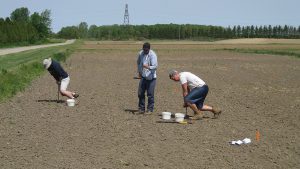Business side: Fire risks
CONVERSATIONS WITH BUSINESS EXPERTS

(J.M) WHAT TYPE OF FIRE RISKS DO TRACTORS AND EQUIPMENT POSE ON THE FARM?
(J.Z.) Motorized equipment, especially tractors, produce a significant amount of heat even after being powered off and stored. As farms grow in size, more machinery is used and stored inside farm buildings. This equipment can represent an increased fire risk. For example, when operating motorized equipment in a dry and dusty environment — which is common in a barn or shed — sparks or heat from the exhaust coming in contact with combustibles can lead to a fire. Response time is crucial; always have easy access to fire extinguishers both within the building and on equipment. Farm equipment outfitted with a block heater and parked inside a building is also a fire hazard. Faulty equipment, block heaters, and extension cords increase the risk of a fire.
WHAT ARE THE TOP ‘CAUSES’ OF FAULTY EQUIPMENT THAT CAN LEAD TO A FIRE?
1. Mechanical failure or malfunction of a block heater.
2. Electrical failure at the extension cord connection and the block heater plug.
3. Electrical failure or damage to the extension cord.
CAN YOU RECOMMEND BEST PRACTICES FOR USING BLOCK HEATERS?
I have the opportunity to assess any risks on a farm, including fires, and in my line of work I see all kinds of hazardous practices and faulty equipment.
Here is my top ‘do’ and ‘don’t’ for block heaters.
Do
• Closely examine the condition of the block heater plug and lead connection. Check for cracked or exposed wiring.
• Make sure all motorized equipment is parked in a safe area away from combustible materials, especially underneath the machine.
• Install battery cut-off switches to de-energize equipment when not in use. This reduces the chances of an electrical fire.
• Consider replacing standard electrical breakers on key circuits, with an “Arc Fault Breaker” or “Arc Fault Receptacle”, which will trip when dangerous electrical arcing is detected from a damaged extension cord, plug, or loose connection.
• Install 15/20 amp arc fault device on 15/20 amp circuits to protect the electrical extension cords and block heaters.
• Regularly inspect your extension cords and scrap those that are light duty or damaged. Most off the shelf extension cords are 16 gauge and should not be used on a farm.
• New 14 gauge and 12 gauge with heavier insulation are now more available at local retailers.
• Regularly inspect and replace all damaged extension cords.
• Inspect barn receptacles for evidence of corrosion or deterioration.
• Consult a licensed electrician on any electrical changes.
Don’t
• Never use old, damaged, light gauge, or multiple extension cords — they can be an ignition source.
• Never use an extension cord longer than required. A coiled extension cord plugged in and powering a block heater cannot disperse heat which can create extreme temperatures and become an ignition source.
• Never use an extension cord buried under debris.
• Never plug in a block heater in an area where combustible materials, such as dust, liquids, or straw, are near or underneath the tractor.
• Never plug in a block heater in an area where there is a high risk of methane gas build up.
WHERE CAN FARMERS FIND MORE INFORMATION ABOUT ON-FARM FIRE RISK ASSESSMENT AND REDUCTION?
The Ontario Ministry of Agriculture, Food and Rural Affairs (OMAFRA) recently published a new resource outlining the top 10 best management practices to reduce fire risk, 10 Ways to Reduce the Risk of Barn Fire, available at ontario.ca/omafra. OMAFRA Publication 837, Reducing the Risk of Fire on Your Farm is another great source of information.
This article was produced as part of the Farm & Food Care Ontario: Livestock Emergency Preparedness Project and the Reducing the Risk of Barn Fires Advisory Panel (2016). A group of concerned Ontario Farm Commodity Groups, Fire Prevention Officers, Electrical Safety Professionals and Government of Ontario staff.
This project was funded in part through the Canadian Agricultural Partnership (the Partnership), a federal-provincial-territorial initiative. The Agricultural Adaptation Council assists in the delivery of the Partnership in Ontario.
Download a pdf of this article here: Ontario Grain Farmer Business side – Fire Risks Feb-2019











